iOS Universal, Android •
This is a weird way to start a review, but I think I’ll probably just keep beating this dead horse all through the post if I don’t do this up front. I’m talking about the theme of Hostage Negotiator and the fact that it’s dark; dark enough that it turns me off a bit. It’s a fairly hypocritical stance, I know. After all, I have no issue with assassinating William Shakespeare in Through the Ages or laying waste to a horde of redcoats in Liberty or Death. Hostage Negotiator feels a little more personal, however. Whether the bad guy is a terrorist or a rogue teacher, the number at the top of the screen represents helpless humans that are going to, very likely, shuffle off their digital coils before you’re done.
I’m not saying Hostage Negotiator is a bad game–you’ll have to read past the break to see how I actually feel–but I felt that I’d keep bringing the theme up at every turn and didn’t want it to bog the whole thing down. There, that’s the last you’ll hear of it. Now let’s talk about the game itself.
Hostage Negotiator is a rather simple card game that offers a twist on the standard deck-building formula. Unlike other games where you add new cards to your discard pile hoping to draw them out on a later turn, here all cards are added directly to your hand. There is no deck or discard pile. When you play a card it’s gone, only returning to your hand if you purchase it again. It’s a smart system that ratchets up the tension by not only limiting what cards you can play each turn, but letting you know up front how few cards you have to turn the conversation in your favor.
The game consists of a set number of turns, each one representing one conversation between you, the FBI agent, and the kidnapper. If you get to the end and you haven’t rescued the hostages and either captured or taken out the villain, you lose. You also lose if more than 1/2 of the hostages end up in the obituary column.
Playing cards can give you “Conversation Points”, which you spend between turns to add cards to your hand or they can lower the Threat, which is an indicator of how trigger-happy the kidnapper currently is. There are also cards that manipulate dice or allow you to reveal the bad guy’s demands.
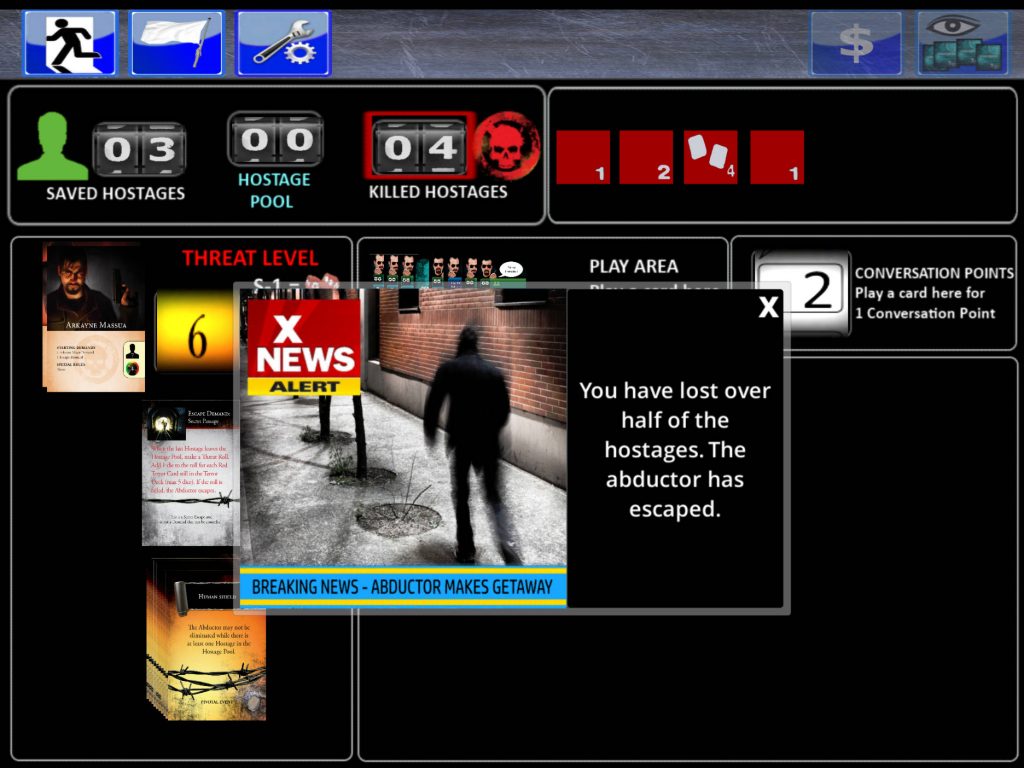
Yes, there are dice in this game. Each time a card is played you will roll the dice and compare results to the three options on the played card. A result of 5 or 6 is considered a success, with more successes meaning better results. Of course, you can use cards to reroll dice or convert a failure to a success. Much of the game comes from manipulating the dice to your favor, and simply relying on good rolls to get you through a conversation is a recipe for a Munich-like disaster.
Kidnapper demands are a tricky thing and I’m not entirely sure I enjoy that part of the game. First you must play a card and roll successes to force them to divulge their demands and then you must spend conversation points to concede to the demand, which will usually get you something in return but will also activate a penalty that remains active until the associated abductor is taken out.
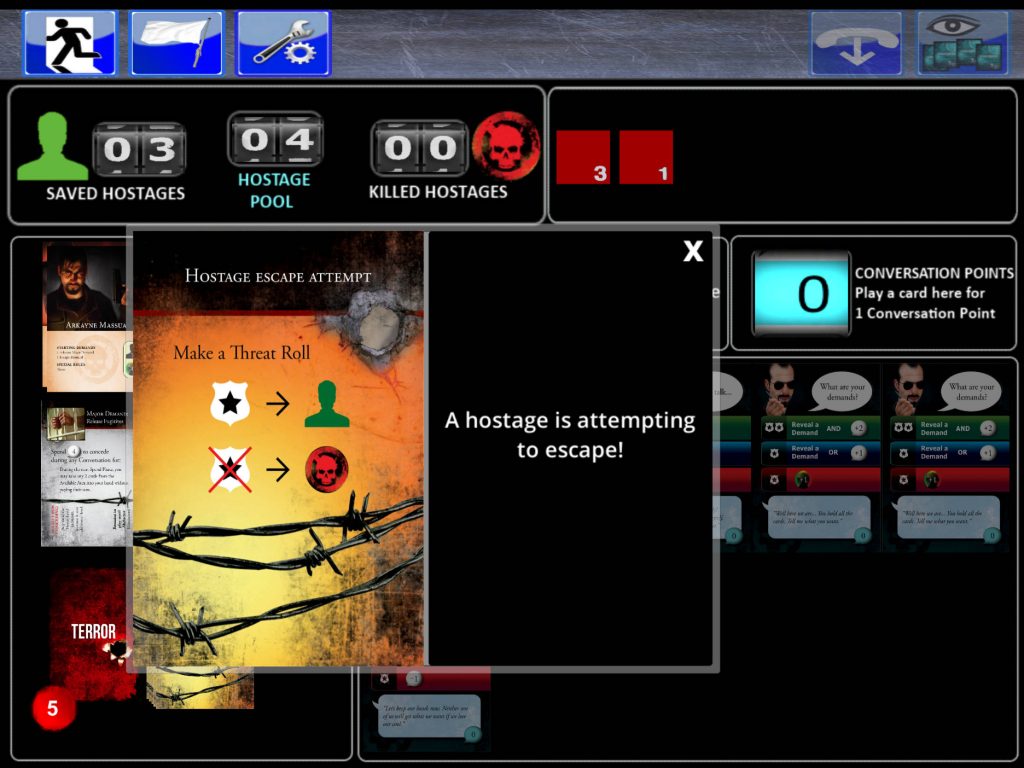
The only reason I don’t really enjoy the Demand cards is that I’m not sure I understand them completely. The app has a fairly great tutorial that got me up and running while playing through an introductory game, but it either skipped over the Demand stuff pretty quick or I’m just slow on the uptake [you can guess our vote -ed.]. Either way, I try to get the demands each game, but I’m not entirely sure why. I ended up having to track down a PDF of the rules online, as there is no digital copy of them in the app.
Hostage Negotiator comes with 3 abductors to battle against and a fourth that you unlock by defeating the first three kidnappers without any tutorial help. I haven’t done this yet. In fact, I’ve only won a single game and that was with three dead hostages on my hands. Needless to say, it was a somewhat hollow victory.
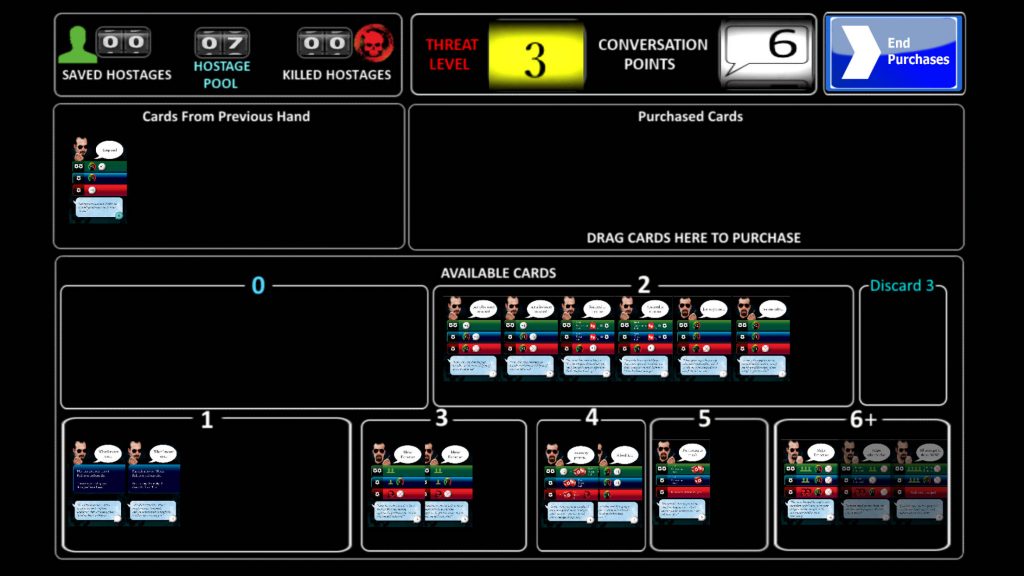
So, from a game standpoint, Hostage Negotiator is great and compares favorably to other solitaire time wasters on your device. Games are relatively short and filled with decision and narrative points that will keep you absorbed until the end. How’s the app, however?
The app is clean and functional, smartly losing the tabletop version’s circular tracks and creating a UI that is easy to navigate. The type on cards is unnecessarily small, however, and on my phone I have to really concentrate to make out lines of text at the bottom of each card. You can tap to enlarge cards, but you need to first focus on that card and then tap again to enlarge it, which feels clumsy. This is particularly difficult on the card purchase screen, where your options are too small to read without highlighting each card in turn. It’s not a deal breaker, but it has caused me to not want to play Hostage Negotiator on my phone unless I’m in a pinch.
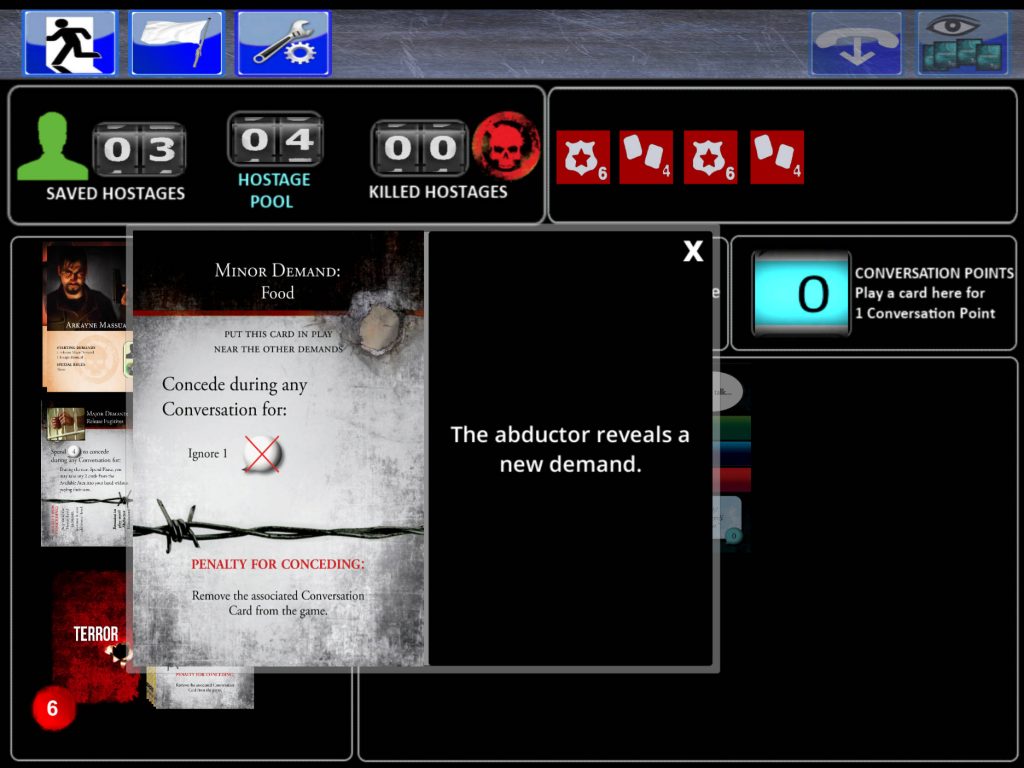
Otherwise, the game plays fine. I have yet to find any bugs and the game does a good job of focusing your attention on where you currently are in the game. You’ll never wonder what cards you can afford or where you need to tap, as everything is nicely highlighted. With the aforementioned tutorial, the game is quite easy to learn even for someone who had never played the physical version.
There are a couple of downsides, the first being the lack of a rulebook. The tutorial almost makes up for the absence, but not quite. It would be nice to look up exactly why something happened, even if it were simply an included PDF. The dice themselves are also clunky and slow, often continuing to roll when a physical die would have stopped. It’s merely a graphical issue, but it would be nice if there were an option to turn off the 3D dice and just see the roll results. I feel like it would speed the game up immensely.
Hostage Negotiator is a pretty great solo card game that I never would have played if this app hadn’t been released. As it is, I’m looking to pick up the physical version so I can take it with me camping or wherever charging my devices isn’t an option. It’s a good, quick solo game and the app does a fine job of bringing it to life. The physical version has a ton of expansions as well, so here’s hoping the digital version fares well enough that we can see some (or all) of that extra content make its way to the small screen down the line.

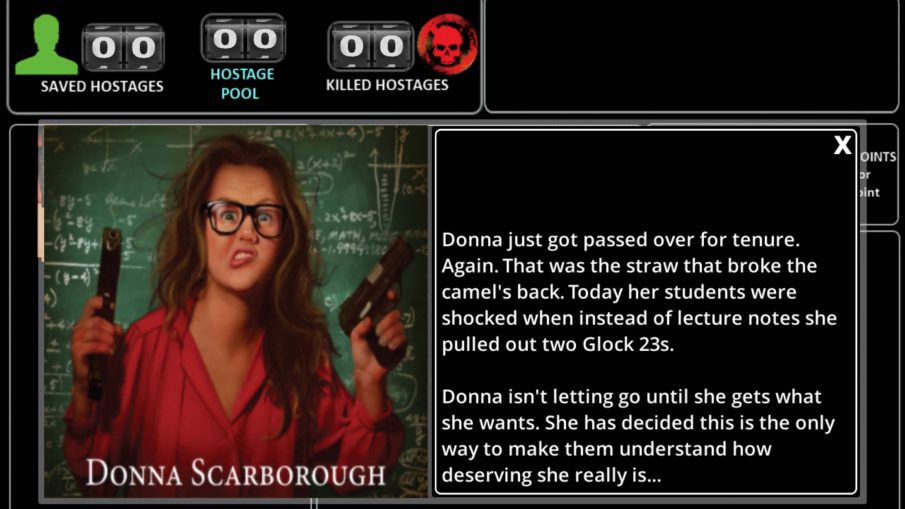

The thing that put me off the cardboard version was the pricing, with the game around £15, and then each expansion scenario around £8 for about 15 cards. :-l
I think the digital will be more reasonable.
Edit: just discovered there’s a ‘non-potable water’ emoticon:
WTF.
My life is now complete.